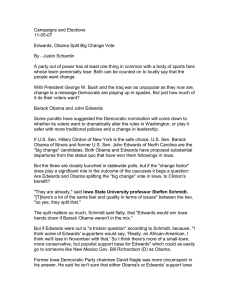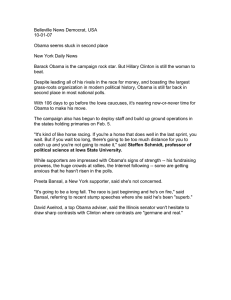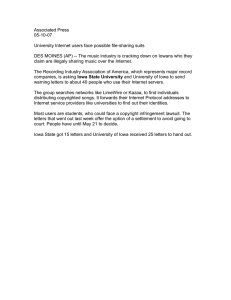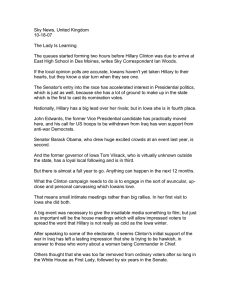National Public Radio (NPR) SHOW: Morning Edition 10:00 AM EST
advertisement
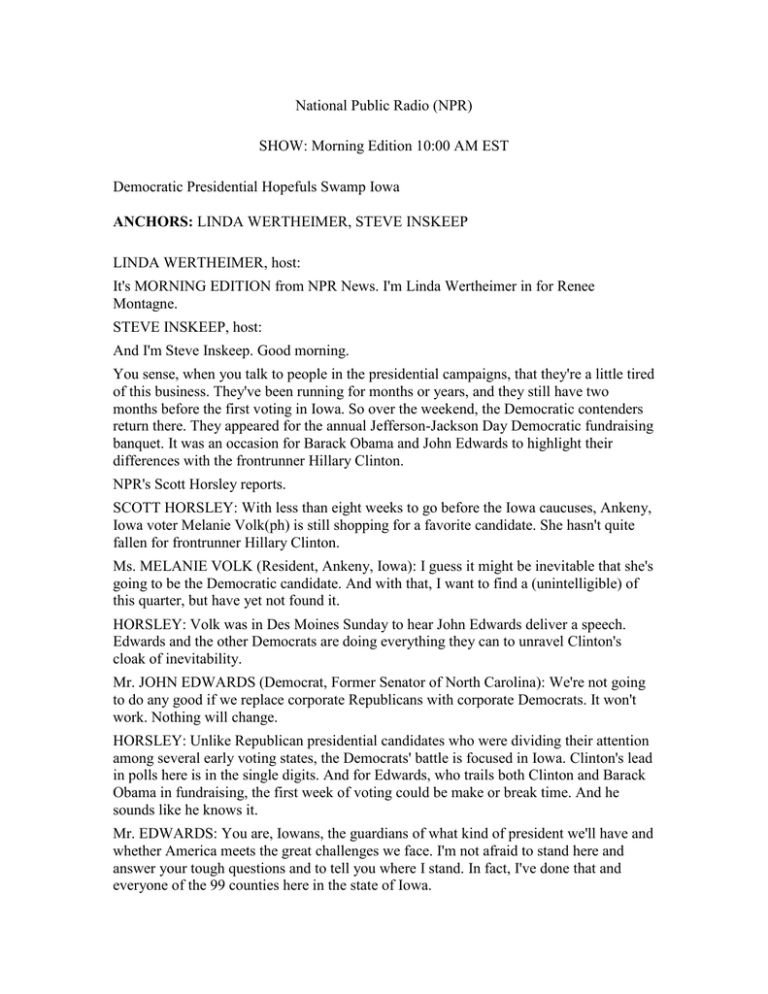
National Public Radio (NPR) SHOW: Morning Edition 10:00 AM EST Democratic Presidential Hopefuls Swamp Iowa ANCHORS: LINDA WERTHEIMER, STEVE INSKEEP LINDA WERTHEIMER, host: It's MORNING EDITION from NPR News. I'm Linda Wertheimer in for Renee Montagne. STEVE INSKEEP, host: And I'm Steve Inskeep. Good morning. You sense, when you talk to people in the presidential campaigns, that they're a little tired of this business. They've been running for months or years, and they still have two months before the first voting in Iowa. So over the weekend, the Democratic contenders return there. They appeared for the annual Jefferson-Jackson Day Democratic fundraising banquet. It was an occasion for Barack Obama and John Edwards to highlight their differences with the frontrunner Hillary Clinton. NPR's Scott Horsley reports. SCOTT HORSLEY: With less than eight weeks to go before the Iowa caucuses, Ankeny, Iowa voter Melanie Volk(ph) is still shopping for a favorite candidate. She hasn't quite fallen for frontrunner Hillary Clinton. Ms. MELANIE VOLK (Resident, Ankeny, Iowa): I guess it might be inevitable that she's going to be the Democratic candidate. And with that, I want to find a (unintelligible) of this quarter, but have yet not found it. HORSLEY: Volk was in Des Moines Sunday to hear John Edwards deliver a speech. Edwards and the other Democrats are doing everything they can to unravel Clinton's cloak of inevitability. Mr. JOHN EDWARDS (Democrat, Former Senator of North Carolina): We're not going to do any good if we replace corporate Republicans with corporate Democrats. It won't work. Nothing will change. HORSLEY: Unlike Republican presidential candidates who were dividing their attention among several early voting states, the Democrats' battle is focused in Iowa. Clinton's lead in polls here is in the single digits. And for Edwards, who trails both Clinton and Barack Obama in fundraising, the first week of voting could be make or break time. And he sounds like he knows it. Mr. EDWARDS: You are, Iowans, the guardians of what kind of president we'll have and whether America meets the great challenges we face. I'm not afraid to stand here and answer your tough questions and to tell you where I stand. In fact, I've done that and everyone of the 99 counties here in the state of Iowa. HORSLEY: Edwards has gone after Clinton for accepting campaign contributions from lobbyists. Obama has also begun to draw distinctions with Clinton. Although political analyst Dianne Bystrom of Iowa State University says Obama is doing it in a kinder, gentler way. Ms. DIANNE BYSTROM (Director, Carrie Chapman Catt Center for Women and Politics, Iowa State University): It's interesting to me because the John Edwards that I saw in 2003 was very much like the Obama I see this year - the candidate of hope, the centrist candidate. HORSLEY: But like Edwards, Obama would love to slow the Clinton bandwagon in Iowa. The Illinois senator appeared on "Meet the Press" yesterday in an hour- long interview from Des Moines. Senator BARACK OBAMA (Democrat, Illinois): The politics of hope doesn't mean hoping that people aren't going to point out difference. Look, we're running for the presidency in the United States of America, not student council president. If I believe one of my opponents is potentially going to take the party or the country in a direction that does not meet our challenges, does not take advantage of the opportunities that are available, I'm going to point it out. HORSLEY: Obama did just that during a fundraising dinner Saturday night. Without mentioning Clinton by name, he said the Democrats need to lead by conviction, not calculation. Sen. OBAMA: The same old Washington textbook campaigns just won't do in this election. Triangulating and poll-driven positions, because we're worried about what Mitt or Rudy might say about us, just won't do. HORSLEY: Speaking at the same dinner, Clinton said she's less interested in attacking her opponents than attacking the problems of America. She said instead of turning on one another, the Democrats should be turning up the heat on Republicans. Senator HILLARY CLINTON (Democrat, New York): I know how easy it is in a campaign to get distracted, to focus on who's up and who's down and who says what about whom. But that's not what this election is about. This election is about those Iowans and those Americans who feel invisible in their own country, who feel invisible to their own president. HORSLEY: Iowans are getting plenty of visibility these days, thanks to the Klieg lights of media attention the candidates have brought to their state. Melanie Volk, who was out early Sunday to hear Edwards speak, is trying to live up to the task. Ms. VOLK: There's a heavy weight on the Iowa shoulders I think. But we're definitely going to caucus, and we're going to get babysitters for the kids then we'd go out and we are, you know, trying to hear everybody. We're going to, you know, take it seriously because I think we have a really important role to play. HORSLEY: Volk and her neighbors may still vote for any of the several candidates. Maybe that's why those candidates and their musical supporters are spending more time in Iowa than anywhere else. Unidentified Man (singing): All right. Let's hear it from everybody one time who wants to board the train. All aboard- say it with me. (Soundbite of cheers) Unidentified Man (singing): Yeah. We're going to take the train to the White House. HORSLEY: Scott Horsley, NPR News, Des Moines.
